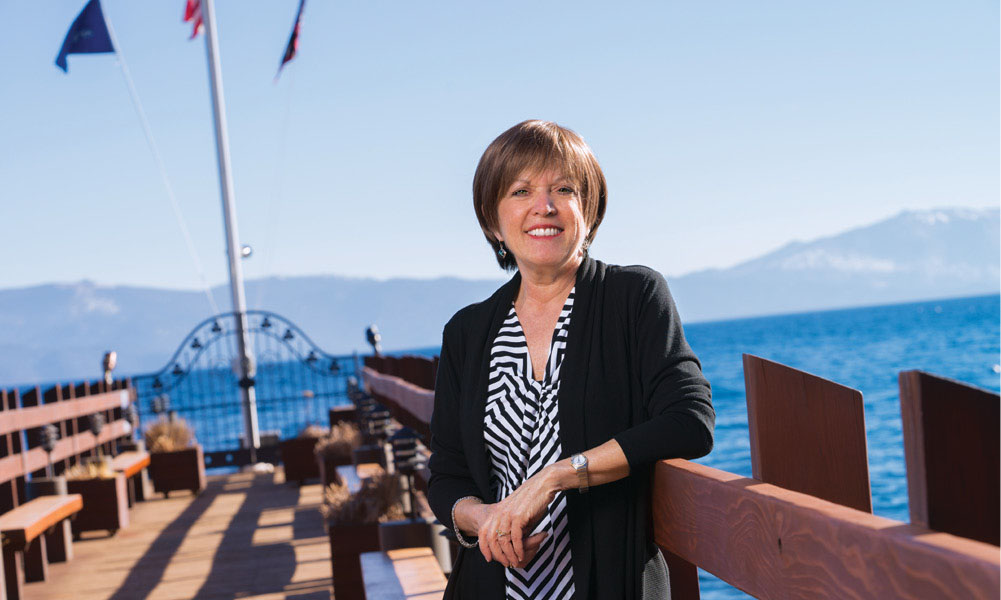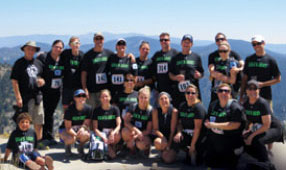
Care close to home
Network benefits ease patient’s journey
Lisa Peltier is all smiles as she breezes into the cancer center at Tahoe Forest Hospital. Everyone she passes says hello; some stop for hugs. Her doctor kisses her cheek. From the receptionist to the infusion nurse to the oncologists, these are neighbors, friends. They are, on many levels, family. The petite, wide-eyed patient would not have it any other way. Fortunately, because the Gene Upshaw Memorial Tahoe Forest Cancer Center in Truckee is part of the UC Davis Cancer Care Network, she doesn’t have to.
Diagnosed with lung cancer, the Incline Village resident has been able to get most of her cancer care in her own community with oversight from a “virtual tumor board” of experts 100 miles southwest at a National Cancer Institute-designated comprehensive cancer center.
“Early on, I thought about going elsewhere for care,” she says. “Some even advised me — ‘You have to go somewhere else.’ They said, ‘You can’t get good care locally.’ But another friend, a nurse, said, ‘There’s a lot to be said about getting your care locally. Part of the healing process is being at home. Your family is there.’”
At the time, Peltier was unaware that Tahoe Forest was affiliated with the UC Davis Comprehensive Cancer Center, an arrangement that would bring a multidisciplinary army of experts and resources to bear against her individual tumor.
The unique partnership, which utilizes telemedicine to link community oncologists with UC Davis cancer specialists, brings more than prestige to the community hospitals in the network.
In a study on the network’s virtual tumor boards published late last year in the journal Community Oncology, researchers reported that providers share rapidly evolving cancer treatment information with their colleagues in more remote areas. That collaboration enables clinicians to make more informed treatment decisions for their patients, resulting in higher-quality care.
“Since most Americans receive their cancer care from community-based hospitals, it is the mission of NCI-designated comprehensive cancer centers to be the regional resource for dissemination of new knowledge and therapy to community partners,” says Richard Bold, UC Davis chief of surgical oncology and lead author of the study. “Telemedicine tumor boards allow for open discussion of patients prior to treatment initiation, ensuring that our community oncologists have the most up-to-date information for treatment decision-making.”
A non-smoker, physically fit with a very active lifestyle, Peltier had no reason to suspect anything when she noticed pain in her shoulder in early 2013. But a follow-up X-ray revealed a lesion in her lung, and a biopsy a few weeks later confirmed it was cancer.
Laurence Heifetz, the Tahoe Forest cancer center’s medical director and Peltier’s oncologist, brought her case to the weekly virtual tumor board, which includes UC Davis specialists in pathology, hematology-oncology, radiation oncology and thoracic surgery linked by teleconferencing technology with Tahoe Forest and physicians at three other hospital-based community cancer centers.
“I presented Lisa’s case within the first week of meeting her because I anticipated the need for surgery,” Heifetz says.
“It is very challenging for a physician in a remote area to be able to honestly feel secure that he or she is up-to-date at all times,” says Heifetz, who trained at MD Anderson Cancer Center in Houston. “An advantage to me and my partners is the real-time interaction, face-to-face, using technology with the UC Davis Comprehensive Cancer Center. It allows me to double-check myself to make sure I am doing the right thing.”
That sense of security, he says, is communicated to patients like Peltier in subtle ways. “Patients realize there is a doctor who is not frightened to ask for help, who is transparent, who recognizes that while we may be in a remote area, we feel most comfortable sending patients for additional help to thought leaders.”
UC Davis thoracic surgeon Elizabeth David was at the tumor board meeting where Peltier’s case was discussed.
“Our intention was to do tri-modality therapy — she would receive chemotherapy and radiation up front in an effort to control the disease,” she explains. “After that, if her disease hadn’t progressed, we would go on to surgery for local control of the tumor.”
Peltier, 60, spent most of the summer undergoing chemotherapy and radiation treatments in Truckee. Throughout, she continued regular exercise, walking or hiking every morning with her yellow lab, Charlie, near and around Lake Tahoe — the rugged Flume Trail, bucolic Sheep Flats meadow and serene Incline Lake. She put in between 55 and 60 miles per month.
In early August, toward the end of her treatments and just weeks before her planned surgery, she was a special guest in the Squaw Mountain Run/Walk, a 2,000-foot climb over a 3.6-mile course to benefit the Tahoe Forest Cancer Center. And while Peltier had to take a cable car to the top this time, she was there to cheer on “Lisa’s Army,” a group who ascended the mountain in her honor.
Unfortunately, what she and her doctors had hoped was a tumor confined to her lung had, in fact, progressed; a scan later detected a spot on her femur. The tumor had metastasized, so surgery would no longer be an option. Instead, her doctor ordered more chemotherapy and radiation treatments.
Peltier would receive those treatments in Truckee, close to home, her job and family.
“A key goal for the UC Davis Cancer Care Network is to provide state-of-the-art care in an environment that is the most familiar and supportive for patients, surrounded by people they trust and care for,” says Scott Christensen, a UC Davis oncologist and network medical director. “Our relationships with our community-based partners allow for this to happen.”
Peltier was able to participate in two clinical trials through UC Davis. For the first, she takes a bone-strengthening drug for patients with metastatic disease. The drug is designed to preserve bone and diminish the progression of the disease. She is also on a trial of Tarceva, a drug that targets a certain genetic mutation for which her tumor tested positive.
Without the Cancer Care Network affiliation, says Heifetz, his patients would not have access to these or most other trials.
“Access to clinical trials is another measure of being at a quality institution,” he says. “But we don’t have enough patients to offer our own clinical trials; we have to participate on a cooperative basis.”
Peltier, for her part, says she is doing well. She is back to work full time as the vice president of a successful health-care consulting firm in Incline Village, where she lives with her husband. She spends a lot of time with her daughter, who also works at her firm, and her son, who lives in town and works as a helicopter pilot. She continues to indulge her passion for long walks, and feels grateful for her ability to take them in her own community.
“It’s just so calming for me to be here,” she says. “Even coming down the road, when I see the lake, it gives me an immediate sense of peace.”

